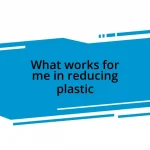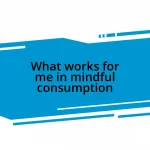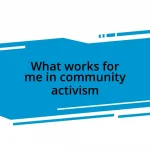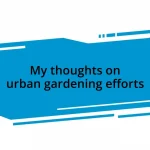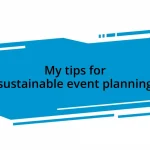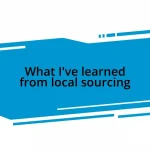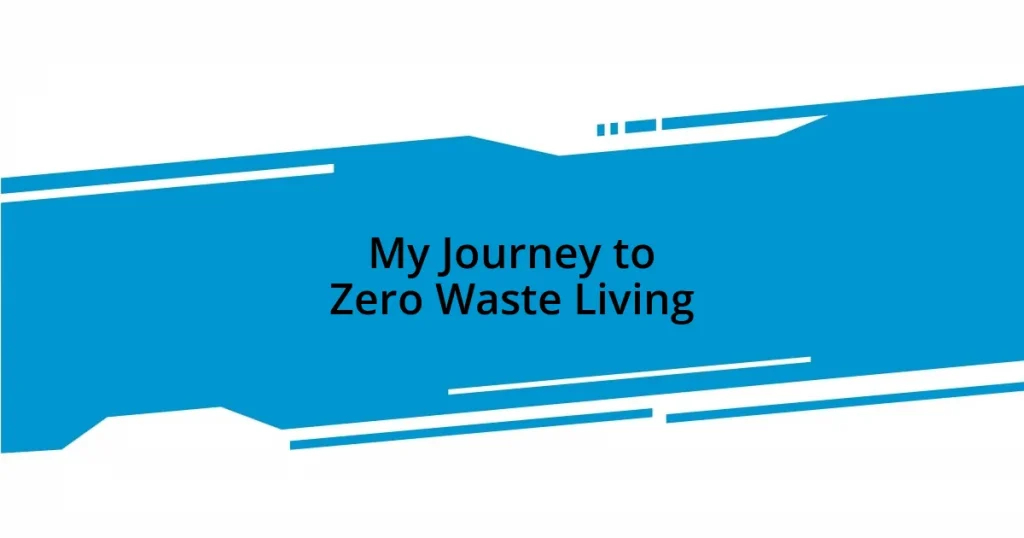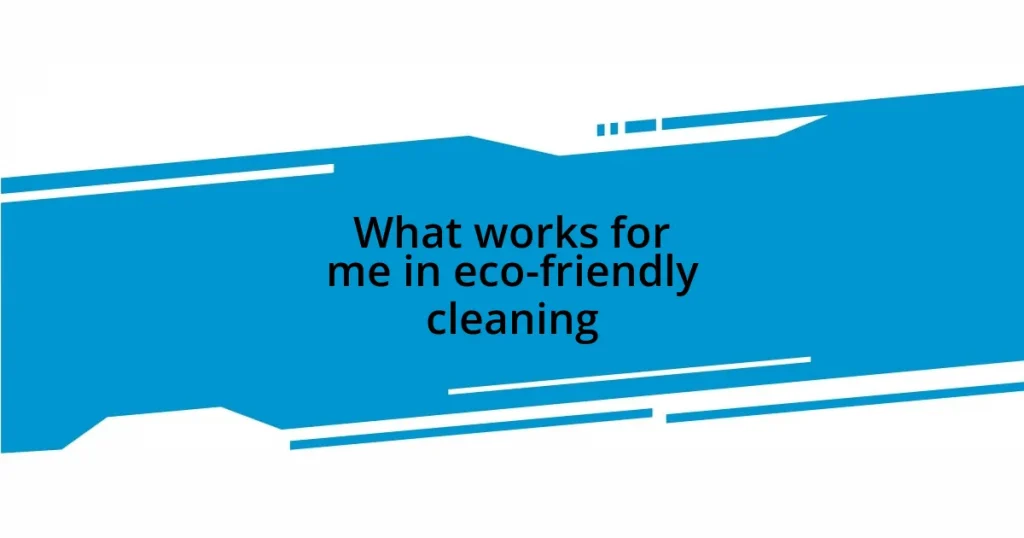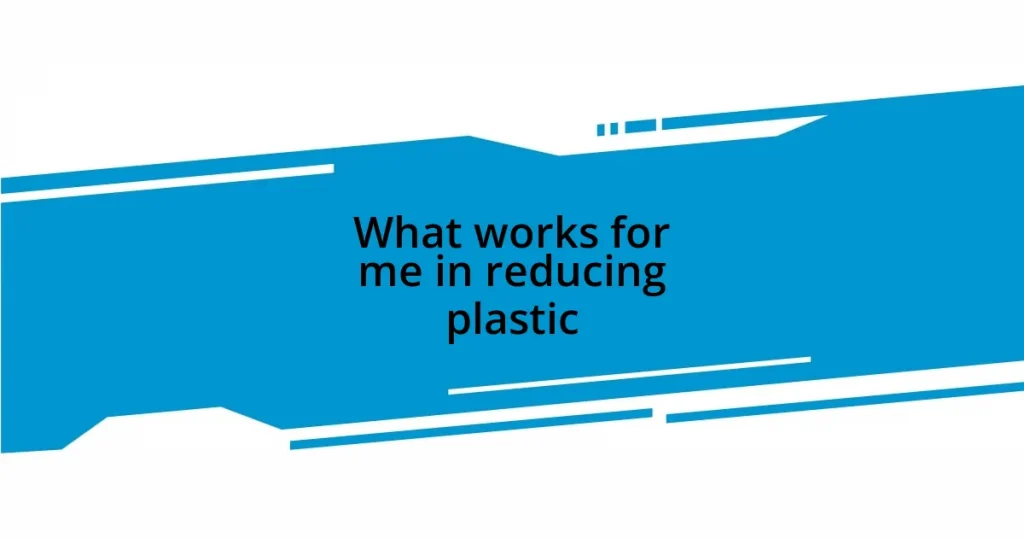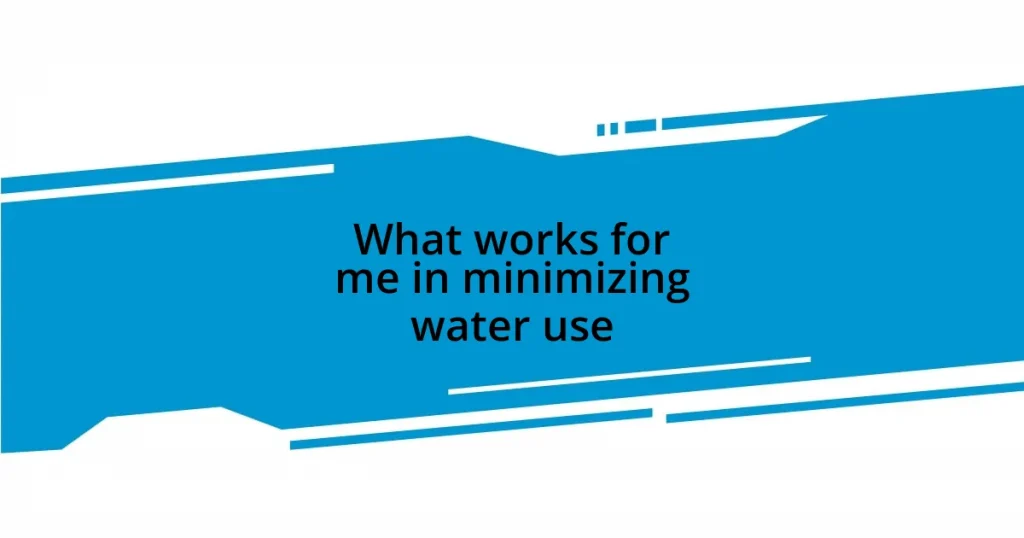Key takeaways:
- The zero waste concept focuses on reducing waste to the point of sending nothing to landfills, requiring a shift in consumption habits.
- Assessing current waste habits is crucial; identifying waste sources helps spark changes and awareness of unnecessary waste.
- Setting realistic, incremental goals fosters gradual improvements, making sustainable living less overwhelming and more achievable.
- Building a supportive community enhances motivation and accountability, making zero waste journeys more collaborative and rewarding.
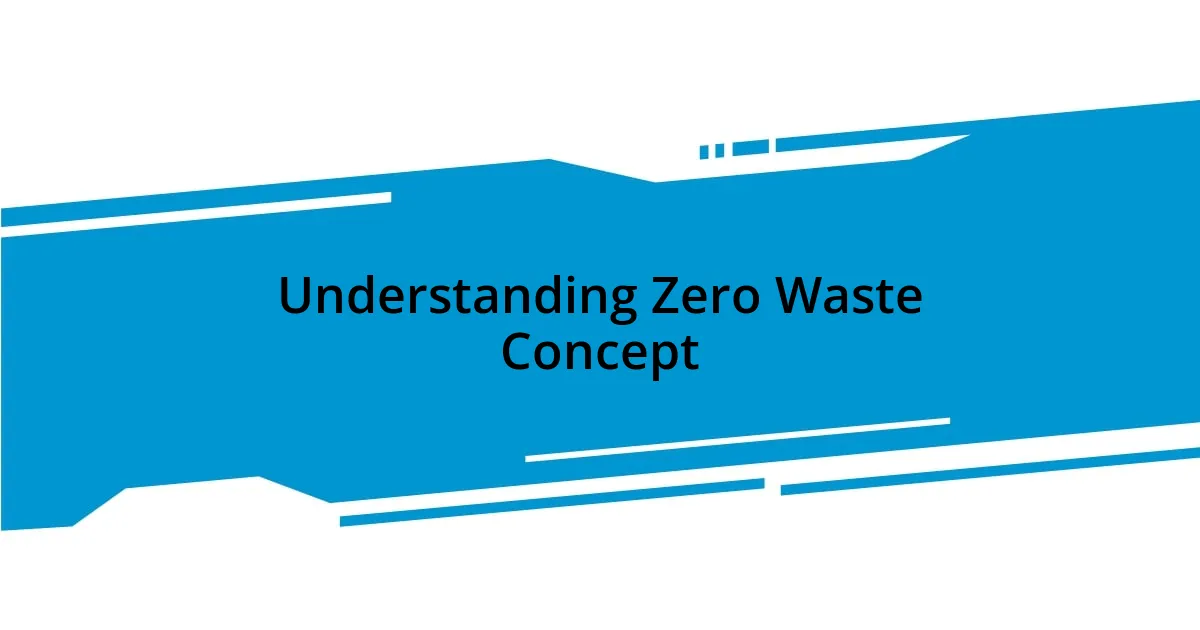
Understanding Zero Waste Concept
The concept of zero waste is centered around the idea of reducing our overall waste, ultimately aiming to send nothing to landfill. I remember the first time I tried to cut down on my trash; I was overwhelmed by the sheer amount of waste I created without even realizing it. Have you ever taken a moment to look at your trash can and wonder where it all comes from?
It’s not just about recycling what we use; it’s a whole lifestyle shift that encourages rethinking our consumption habits. I found that when I started to truly understand what I was buying, I became more intentional about my purchases. This conscious decision-making doesn’t just benefit the planet; it also fosters a personal sense of accountability.
In essence, going zero waste challenges us to be creative with what we already have and to embrace alternatives that minimize our impact. I often ponder: how can I transform my everyday actions into a force for good? Every small step, whether it’s using a reusable bag or composting, adds up to creating a healthier earth for future generations.
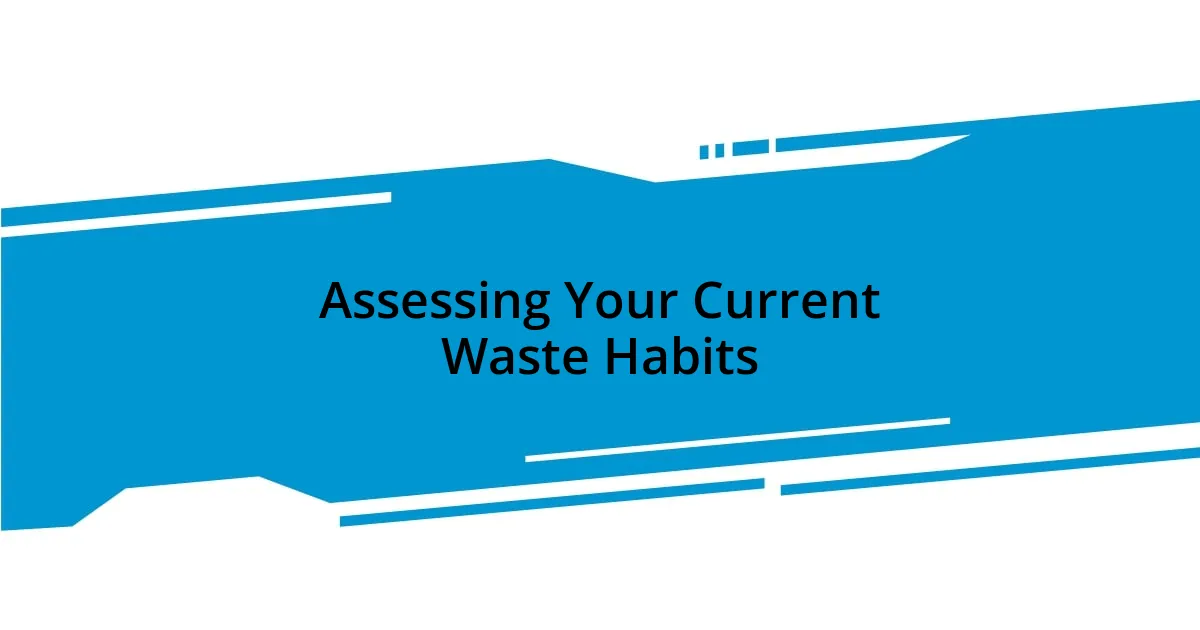
Assessing Your Current Waste Habits
Assessing your current waste habits can be an eye-opening experience. I remember the first time I tracked my waste for a week; I never imagined how much I threw away. It can be hard to face the reality of our consumption, but it’s essential for change. Identifying where your waste comes from is a crucial first step in the zero-waste journey.
To get started, try to focus on these areas:
- Food Packaging: How much of your grocery waste comes from packaging?
- Single-Use Items: Do you often use cups, plates, and utensils just once?
- Clothing and Textiles: What do you do with clothes you no longer wear?
- Compostable Waste: Are you composting your food scraps?
- Personal Care Products: Do you use products with excessive packaging?
Taking a closer look at these habits can spark a desire for change. I was shocked to see how much of my waste was unnecessary, like the excessive plastic wrapping on my favorite snacks. It made me realize that even small alterations, like choosing bulk bins or reusable bags, can create a lasting impact on our planet.
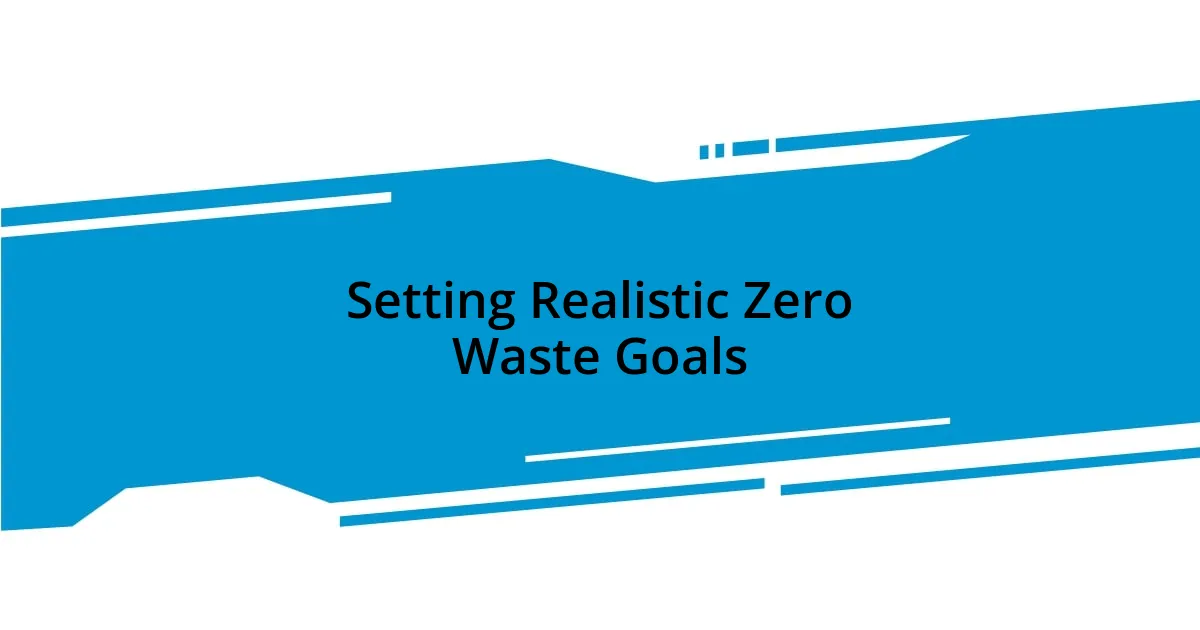
Setting Realistic Zero Waste Goals
Setting realistic zero waste goals is essential for making sustainable changes in our lives. I’ve found that small, actionable steps help avoid the overwhelm that can easily accompany such a significant lifestyle shift. For instance, starting with just one reusable item—like a water bottle—can create a ripple effect, encouraging me to explore other areas of my life where I can reduce waste.
For a clearer understanding, consider breaking your goals down into specific categories. This not only helps you track your progress but also allows for tailored adjustments along the way. I experienced a sense of accomplishment when I set a goal to reduce food waste by planning meals weekly. Each week, I became more adept at using leftovers creatively, like transforming last night’s veggies into a delicious stir-fry.
When setting your goals, it’s crucial to be kind to yourself and recognize that perfection isn’t the aim. One of my early missteps was setting overly ambitious targets, leading to frustration when I couldn’t keep up. Now, I focus on gradual improvements, celebrating victories—big or small—along the journey. A few weeks ago, I was thrilled to find a new local store that offered package-free options. This discovery not only made my shopping experience enjoyable but also aligned beautifully with my zero waste aspirations.
| Goal | Realistic Approach |
|---|---|
| Reduce plastic use | Start with a reusable water bottle and bags. |
| Minimize food waste | Plan meals weekly and use leftovers creatively. |
| Compost waste | Begin composting food scraps with a small bin. |
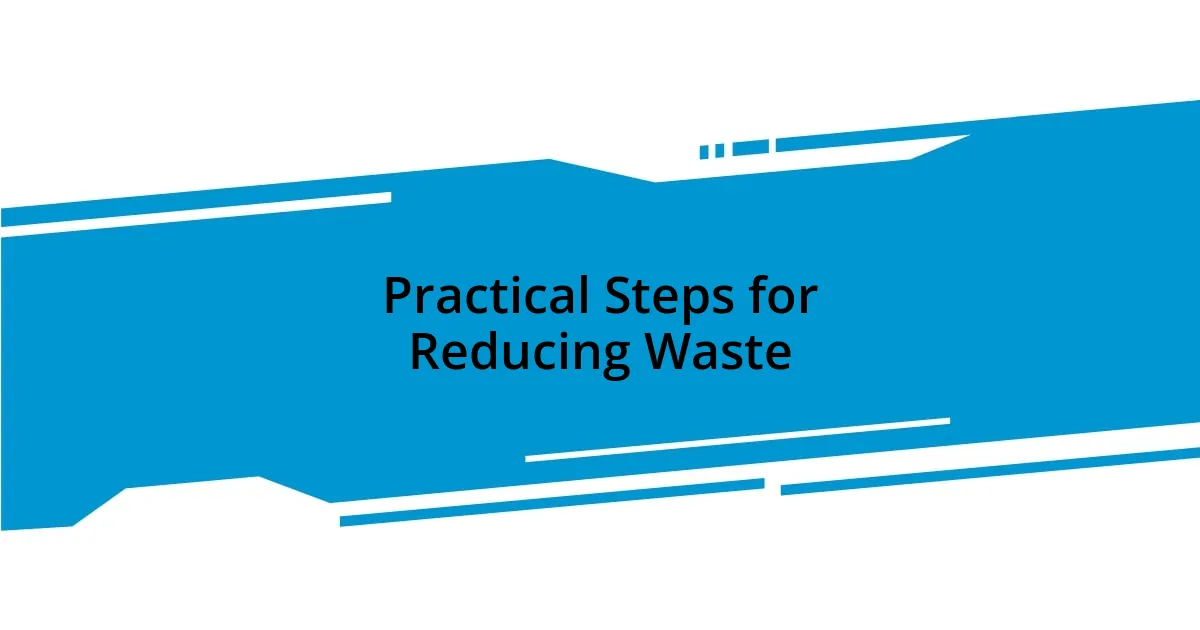
Practical Steps for Reducing Waste
One of the most effective practical steps I’ve taken to reduce waste is to reassess my shopping habits. I used to grab convenience items without thinking twice, but once I began visiting local farmers’ markets or bulk stores, I saw a significant drop in my packaging waste. Have you ever considered how much packaging you might be eliminating just by choosing fresh produce?
Another impactful change has been sourcing second-hand goods whenever possible. I remember my excitement when I first discovered thrift shops. Not only did I find some amazing pieces, but I also felt a sense of satisfaction knowing I was giving items a second life. Plus, it’s quite fun to hunt for unique treasures that you won’t find in mainstream stores. Have you tried exploring your local thrift scene?
Don’t underestimate the power of small changes in your daily routine. For example, I started carrying a reusable cutlery set and collapsible straw in my bag. It seems minor, but the first time I refused a single-use plastic fork, I felt empowered. How many times have you been caught unprepared and ended up contributing to the waste problem? These simple adjustments might just influence your lifestyle, too.
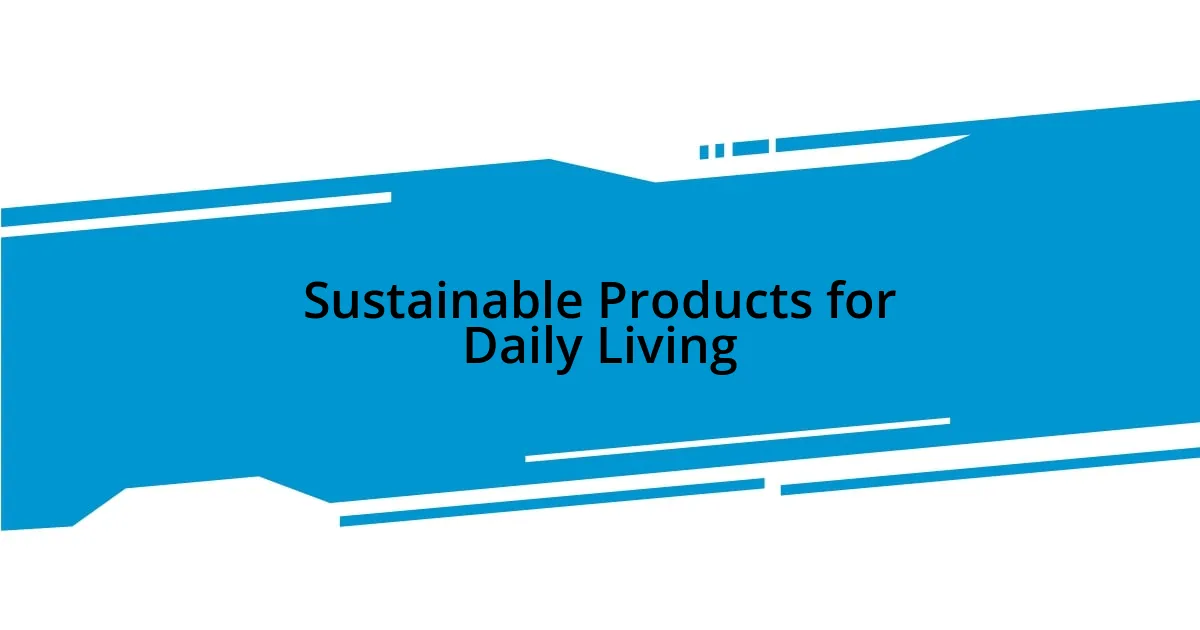
Sustainable Products for Daily Living
When it comes to integrating sustainable products into daily living, I’ve found that choosing reusable items is a game changer. A few months ago, I switched to beeswax wraps instead of plastic wrap. The first time I wrapped my leftovers in them, I felt a sense of joy knowing I was making a small, yet impactful choice. Have you ever asked yourself how much plastic wrap you’ve used over the years? It’s surprising!
Another area where sustainable products shine is in personal care. After discovering bamboo toothbrushes, I was hesitant at first. However, once I made the switch, I found it oddly satisfying to brush my teeth knowing I was reducing plastic waste. Plus, the simple act of holding a bamboo toothbrush somehow feels more natural. Isn’t it fascinating how even our daily routines can align with eco-friendly values?
Additionally, I’ve embraced the importance of sustainably sourced cleaning products. I started making my own cleaning solutions using vinegar and essential oils, which were surprisingly effective and pleasant to use. The first time I wiped down my kitchen surfaces with my homemade cleaner, I felt a real connection to my space. It’s empowering to know that I can maintain a clean home while being responsible to the planet. Have you considered how your cleaning choices impact the environment? Making small switches can pave the way for a more sustainable lifestyle.
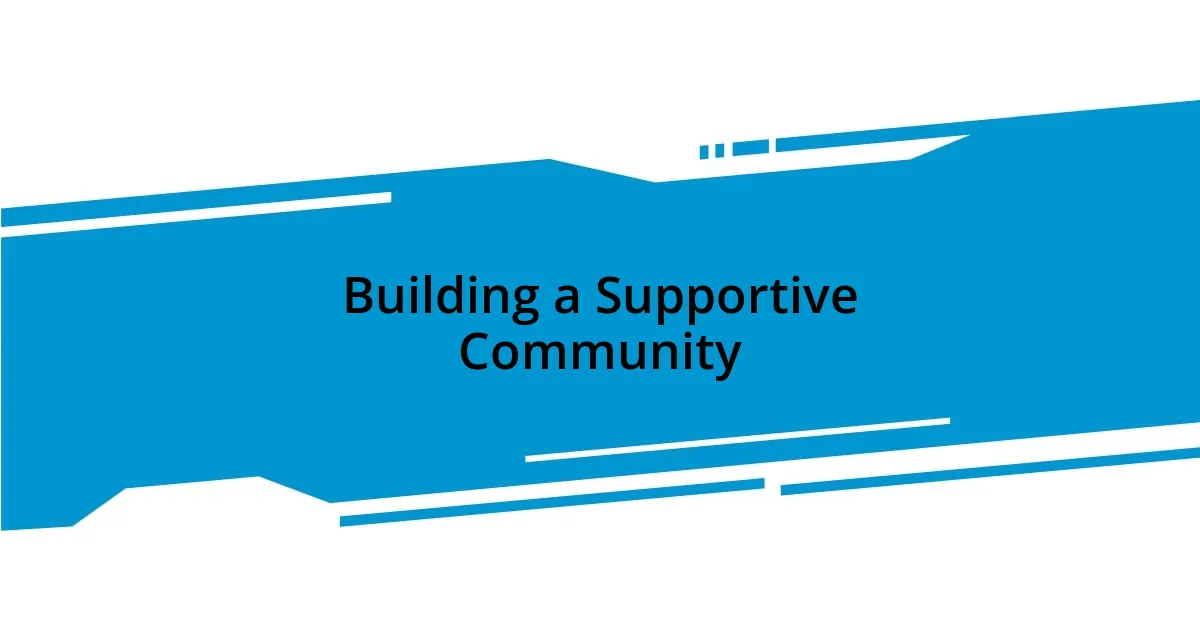
Building a Supportive Community
Building a supportive community around zero-waste living can be a transformative experience. I distinctly remember joining a local Facebook group focused on sustainable practices, where I found not only valuable tips but also like-minded people eager to share their journeys. It’s amazing how a simple online connection can lead to real friendships and, ultimately, a deeper understanding of our collective impact. Have you ever thought about how social media can foster genuine community support?
Attending local meet-ups can amplify that sense of connection. I vividly recall a zero-waste potluck I attended, where everyone brought their favorite sustainable dish—no disposable plates in sight! Sharing ideas over delicious food not only fueled my passion but also provided a safe space to discuss challenges. We swapped stories about our ups and downs in the journey, and it felt comforting to know I wasn’t alone. Have you experienced that feeling of camaraderie when discussing shared goals?
Creating a supportive network also involves lifting each other up with encouragement. I remember when a friend texted me after she successfully quit using plastic straws for a month. Her excitement was contagious! We all have those moments where a little praise can spark motivation. By celebrating each other’s milestones, no matter how small, we build a stronger community that inspires everyone to keep pushing towards more sustainable habits. What could your community achieve if everyone supported each other in meaningful ways?
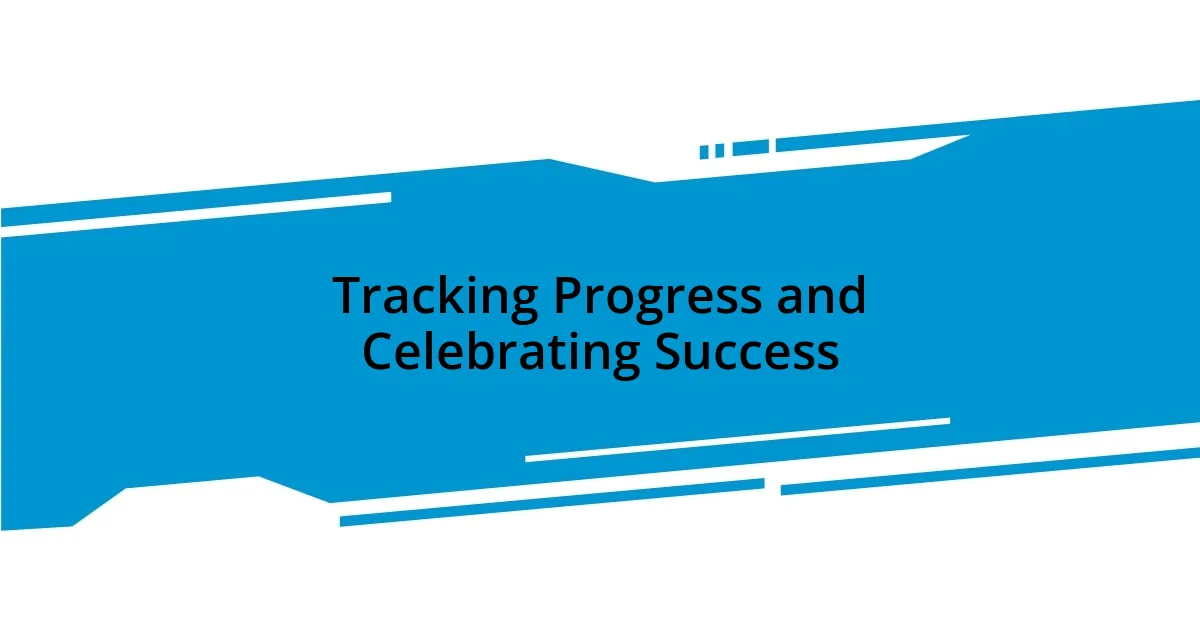
Tracking Progress and Celebrating Success
Tracking my progress on the journey to zero-waste living has been both revealing and rewarding. I started by keeping a simple journal where I recorded my waste reduction each week. It surprised me how empowered I felt when I saw the tangible decrease in my waste. Have you ever felt exhilarated by a milestone, no matter how small? It’s those little victories that pave the way for substantial change.
Celebrating each success, whether it’s using reusable bags for a month or finally mastering bulk shopping, adds a layer of joy to the journey. I remember treating myself to a little self-care day after a successful month of avoiding single-use plastics. I made my favorite vegan treat and enjoyed it guilt-free, reveling in the fact that I was making choices aligned with my values. How do you reward yourself for your achievements?
Moreover, sharing these successes with friends or on social media has created an engaging ripple effect. I recall posting about my journey on Instagram, and it sparked numerous conversations with people wanting to learn more. That feedback inspired me to keep going, knowing I was not only tracking my journey but also motivating others to take small steps toward zero waste. Have you noticed how sharing your experiences can inspire those around you? It’s a beautiful way to amplify our collective efforts.


